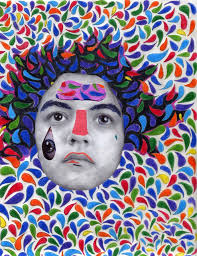Hi all. I’ve been trying to write a post to follow up on the self-narrative post I put up last. I’ve found that a certain paradox stands in my way. The pull toward a coherent self-narrative is so strong. Partly because, from the outside, we look like a single person. And where do we learn how to see ourselves? From the outside. From the perspective of others. From our parents and caregivers, while growing up, starting in earliest infancy. Oh, isn’t he cute! (Not aren’t they cute!) These others who love me, they see me as a single person. So that must be what I am. Also, we feel like unified beings in the sense that we have one body. Just one. When any part of me is in pain, it’s my pain. It belongs to a unitary me. When I die, it’s all of me that dies.

Yet the reality looks different from inside. There’s so much going on in “me”. Last post I observed that there seem to be multiple self-narratives. This is especially obvious, and maybe especially extreme, in addiction. The classic version is “the addict self” versus “the good self” or “caring self” or…what have you. When I was an addict, it was pretty straightforward. I was a good student by day, then I’d become Robin Hood when it got dark, stealing from the rich and giving to the poor — i.e., me! Each part had its own history, its own motives, and its own — highly contradictory — goals.
Should we think of these as incompatible self-narratives, and view each as separate, with a sort of life of its own, yet worthy of acceptance and compassion? Should we  stop trying so hard to unify them? Because sometimes…you just can’t. They simply don’t fit. And the effort to weld them together can be overwhelming, soul-destroying, can leave us feeling more fragmented than we already were. The
stop trying so hard to unify them? Because sometimes…you just can’t. They simply don’t fit. And the effort to weld them together can be overwhelming, soul-destroying, can leave us feeling more fragmented than we already were. The  infamous “dry drunk” is one victim of this misguided struggle.
infamous “dry drunk” is one victim of this misguided struggle.
That’s what I suggested last post…along with an “uber-self” who’s pretty hard to define. Yet I’m not sure it’s right. Maybe we have just one, or just one main, self-narrative — this is who I am, this is who I was, this is who I want to become.
 Or who I expect to become — a very different way to frame a future self!
Or who I expect to become — a very different way to frame a future self!
Maybe the project is indeed (as the psychologists and philosophers claim) to make that self-narrative coherent. Maybe that’s the job. It’s just that there are aspects of the self, parts of the self, that don’t fit. Wanting to get high, choosing  to get high, being determined, being defiant about getting high. (Even in the world of “normies,” there are parts that don’t fit the narrative.) Maybe it’s best so see these as strands of the self-story that truly aren’t compatible with the rest. Maybe they are “clips” (when we actually bother to see them at all), but not self-stories per se. In fact, maybe their incompleteness reflects this. Maybe those strands are “doomed” to remain incomplete.
to get high, being determined, being defiant about getting high. (Even in the world of “normies,” there are parts that don’t fit the narrative.) Maybe it’s best so see these as strands of the self-story that truly aren’t compatible with the rest. Maybe they are “clips” (when we actually bother to see them at all), but not self-stories per se. In fact, maybe their incompleteness reflects this. Maybe those strands are “doomed” to remain incomplete.
(By the way, if you doubt the diversity of self-images, cover one half of the face above, then cover the other half. Did you see the same person? Think about the two halves of your brain — they process things very differently.)
Anyway, I’ve been thinking about this and trying to come up with something like a resolution. (I’ve always liked to create theories or models, but they have to be — guess what? — coherent.) I’ll let you know if I get any closer.
Meanwhile, Isabel sent me this powerful and beautiful poem, so I (we) want to share it with you. It seems to show that desire, in reaching too far for completion, finds that which cannot cohere.

|
Letting the Emptiness Become My Government |

Leave a Reply to Annette Stewart Cancel reply